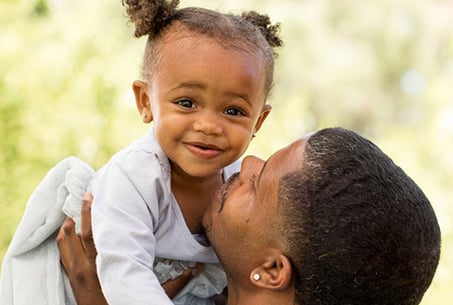Family Voices: A Father’s Perspective in Family Engagement
4 min read
Date Published: 04/30/2019
Last Updated: 04/30/2019
National Fatherhood Initiative Blog / Latest Articles
4 min read

As a single father and kinship care provider, I often encountered a lack of father engagement during my search for quality and affordable child care. There was a lack of dignity and respect for my role as a father. In my professional experience, working with at-risk youth and on fatherhood initiatives, I see these barriers repeated for other fathers trying to get involved in the early nurturing, development and care of their babies. That is why I am here to discuss father engagement and give some common sense ideas for father friendly practices.
Father Engagement refers to two things in this blog.
I believe that many of the issues our society deals with are related to a lack of father engagement. According to a 2010 study, 72% percent of Black children are being raised in homes without their father. Imagine how this effects a child’s sense of security and self-esteem! Could this play a role in the disproportionate number of African American children being expelled from child care? Is there a connection between father engagement in early childhood and child care? My perception is that there might be a disconnection that we can begin to bridge with a few common sense strategies.
Word on the street is that “bonding” and “attachment” is what makes parents instinctively care for and nurture their children. Bonding refers to the special attachment that forms between a parent and their new baby. This bond is what sends parents rushing into their newborn’s room in the middle of the night at the slightest whimper. If ¾ of a population of fathers are not in the home with the child, then fathers that are not positioned to experience the bonding that occurs with holding, feeding, diaper changing, and skin-to-skin contact with the child. When and where does the bond between father and children occur?
Child care organizations, providers and communities play such an integral and important role in engaging and supporting fathers during these early years. Birth to age five is a time when development and attachment is critical and it’s in the best interest of children that we strive to be more aware of and intentional about encouraging father engagement. Additionally, early care and education professionals, programs, and systems can get more creative around how they engage fathers. I challenge you to consider how you can promote both types of father engagement by exploring the following opportunities.
Providers
System-Level Professionals
If you implement even a few of these recommendations, my guess is that more fathers would welcome the opportunity to become engaged in the early development and education of their children.
 Ray Washington is a father, grandparent, kinship provider, and role model for children in his community. He is an advocate for healthy parent-child relationships, father engagement, and accessible community resources. Most recently, he was part of the team that produced the PBS documentary Finding Fatherhood In Colorado. This article was originally posted on April 17th, 2019 at childcareaware.org and is reposted here with permission from ChildCare Aware of America.
Ray Washington is a father, grandparent, kinship provider, and role model for children in his community. He is an advocate for healthy parent-child relationships, father engagement, and accessible community resources. Most recently, he was part of the team that produced the PBS documentary Finding Fatherhood In Colorado. This article was originally posted on April 17th, 2019 at childcareaware.org and is reposted here with permission from ChildCare Aware of America.
Date Published: 04/30/2019
Last Updated: 04/30/2019
Download this free guide for a proven 7-step roadmap—from making the case and securing funding for your program, to launching and measuring real results!


Train Your Staff
Fatherhood Programs
Fatherhood Data
© 2026 National Fatherhood Initiative®. All rights reserved.